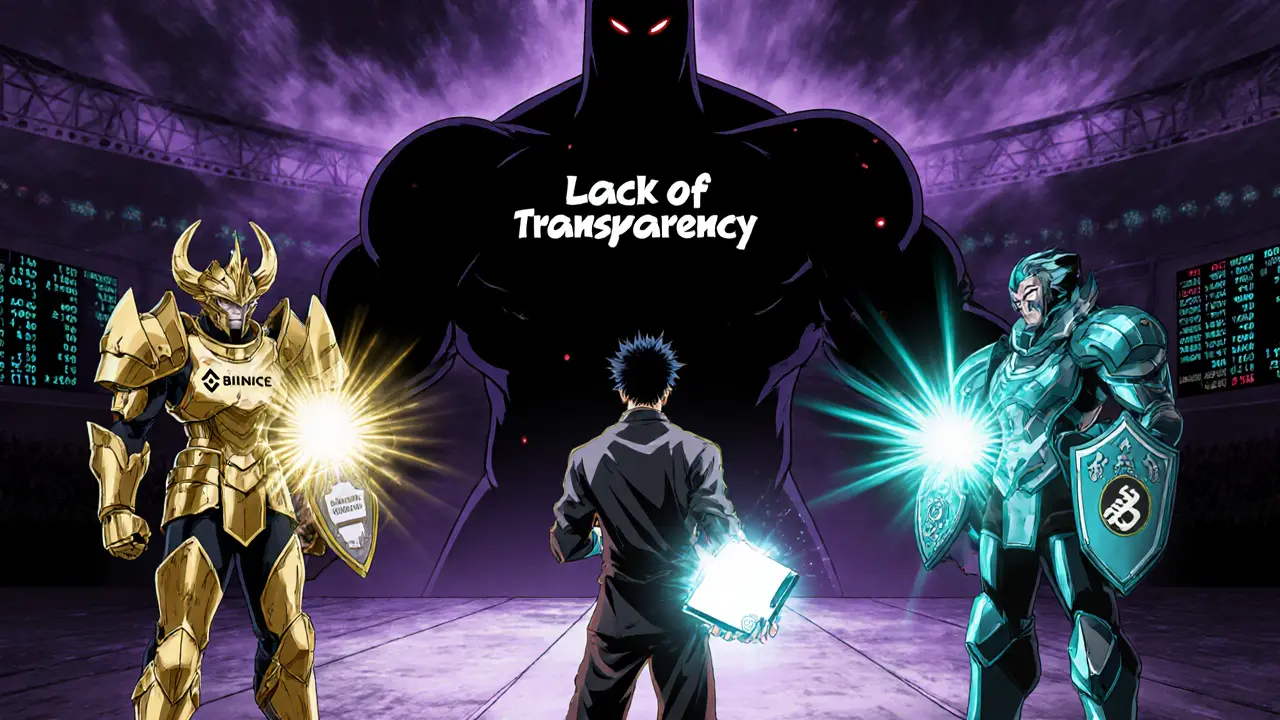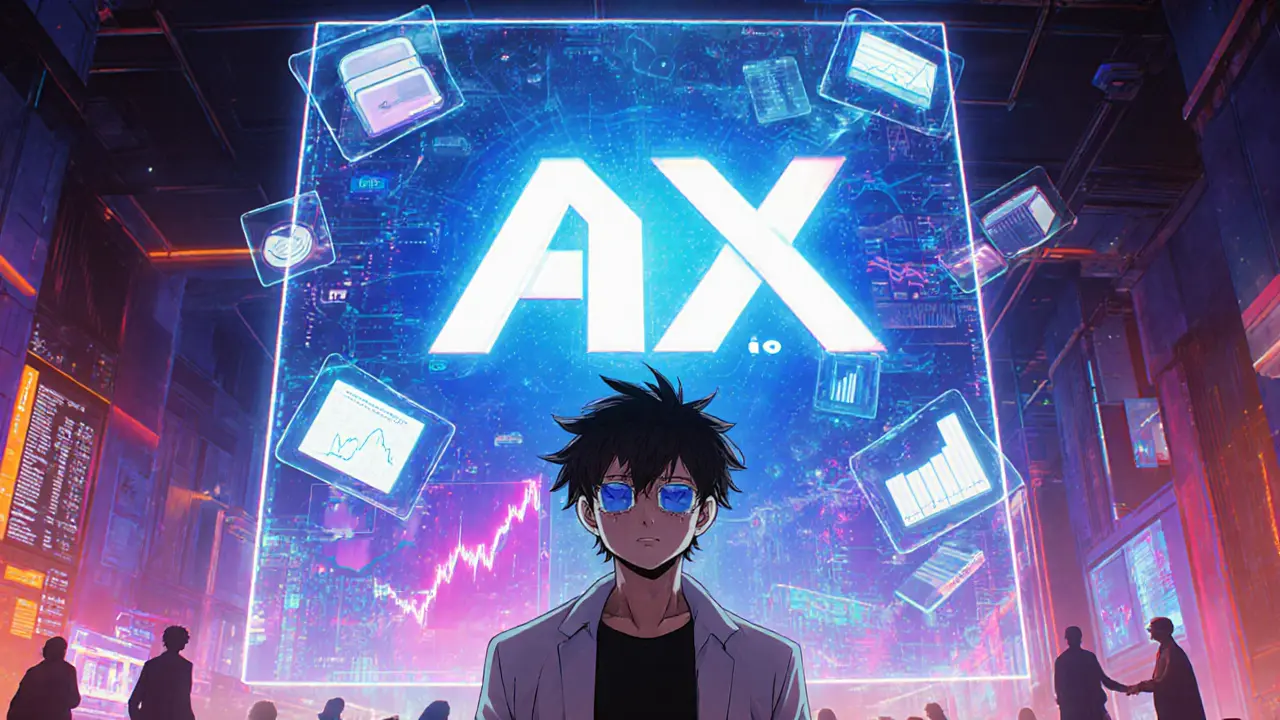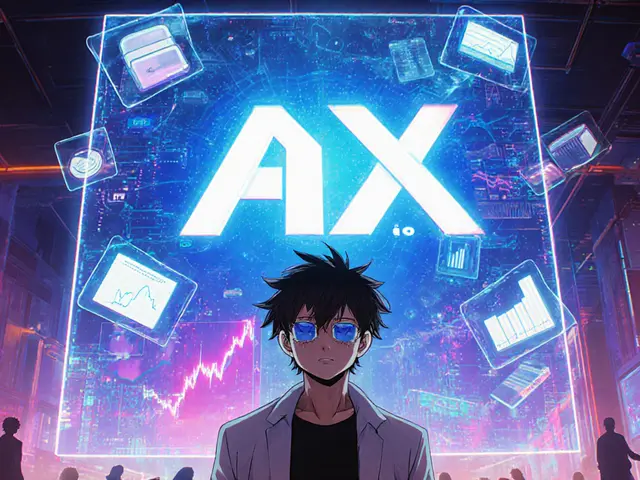ABX.io Exchange Comparison Tool
Feature Comparison: ABX.io vs. Binance vs. Bybit (2025)
| Feature | ABX.io | Binance | Bybit |
|---|---|---|---|
| Trading Model | Hybrid CEX/DEX | Centralized | Centralized |
| Spot Pairs | ~100 (claimed) | 351+ | 200+ |
| Futures Leverage | Up to 20× | Up to 125× | Up to 200× |
| Copy Trading | Yes | No native | No native |
| NFT Marketplace | Integrated launchpad | Separate Binance NFT | None |
| 24-h Spot Volume (Oct 2025) | - (no data) | $3.2 B | $1.5 B |
| Regulatory Disclosures | None publicly listed | US/EU licenses, KYC | US/UK licenses, KYC |
| Security Audits | Not publicly verified | Annual third-party audits | Third-party audits + insurance |
Pros of ABX.io
- Hybrid CEX/DEX concept appeals to advanced users
- Copy-trading and built-in NFT launchpad in one package
- Self-custody model reduces exchange-level custodial risk
Cons of ABX.io
- No verifiable trading volume or market data as of 2025
- Lack of regulatory licensing, third-party audits, or insurance
- Scarce community presence and limited customer support options
- Opaque fee schedule and withdrawal limits
Analysis Summary
ABX.io positions itself as a hybrid exchange combining centralized and decentralized features. While its core offerings like copy-trading and an integrated NFT launchpad are unique, it lacks critical indicators of maturity such as:
- Real-time trading data and volume metrics
- Public regulatory disclosures
- Third-party security audits
- Active community and customer support
For most traders, established exchanges like Binance and Bybit offer greater transparency, liquidity, and regulatory assurance.
When you hear about a new crypto venue promising "the best of both worlds," the first question is: does it actually deliver? This ABX crypto exchange review breaks down what ABX.io claims, what the data shows, and whether the platform deserves a spot in your trading toolbox.
Quick Summary
- ABX.io launched in early 2022 as a hybrid CEX/DEX but provides almost no live market data in 2025.
- Core tools include spot, futures, copy trading, staking pools, and an NFT launchpad.
- Security claims focus on user‑controlled wallets, yet third‑party audits and insurance details are missing.
- Compared to Binance and Bybit, ABX.io shows negligible volume, no regulatory disclosures, and limited community chatter.
- For most traders, established exchanges remain the safer, more transparent choice.
What Is ABX.io?
ABX.io is a hybrid cryptocurrency exchange that blends centralized and decentralized trading features. ABX launched on January 12, 2022, positioning itself as a platform where users can "bring their own wallets" while still accessing spot and derivatives markets.
The site markets a sleek UI, an NFT marketplace, and a copy‑trading engine. However, the company’s founding team, headquarters, and legal structure remain undisclosed, which makes trust assessments harder.
Key Features on Paper
ABX.io advertises a broad toolbox:
- Spot trading: standard buy‑sell of 100+ crypto pairs (claimed).
- Futures contracts: leverage up to 20× on major coins.
- Copy trading: follow top performers via an automated routing system.
- Staking pools: earn passive yields on supported assets.
- NFT launchpad & marketplace: create, list, and trade NFTs within the same account.
Each feature is presented as a self‑contained module, but actual user experience varies because official tutorials, fee schedules, and withdrawal limits are rarely published.
Security Model and Custody
The platform’s headline claim is that users retain control of private keys by connecting external wallets. In theory, this reduces the exchange’s custodial risk, but it also shifts the burden of key management entirely onto the trader.
There is no public evidence of cold‑storage percentages, multi‑signature vaults, or regular proof‑of‑reserve audits. No insurance coverage has been announced, unlike major players that tout $100M+ crypto crime policies.
Market Activity - Where’s the Data?
Checking CoinMarketCap in October 2025 shows "No data is available now" for all ABX.io trading pairs, volume, and market caps. That silence suggests one of three scenarios:
- Extremely low trading activity that falls below reporting thresholds.
- Technical glitches preventing data feeds from reaching aggregators.
- Potential operational pause or shutdown.
By contrast, the same snapshot for Binance displays $3.2B in 24‑hour spot volume, and Bybit reports $1.1B in futures turnover. The data gap makes it risky to allocate capital to ABX.io without independent verification.

How ABX.io Stacks Up Against the Leaders
| Feature | ABX.io | Binance | Bybit |
|---|---|---|---|
| Trading Model | Hybrid CEX/DEX | Centralized | Centralized |
| Spot Pairs | ~100 (claimed) | 351+ | 200+ |
| Futures Leverage | Up to 20× | Up to 125× | Up to 200× |
| Copy Trading | Yes | No native | No native |
| NFT Marketplace | Integrated launchpad | Separate Binance NFT | None |
| 24‑h Spot Volume (Oct2025) | - (no data) | $3.2B | $1.5B |
| Regulatory Disclosures | None publicly listed | US/EU licenses, KYC | US/UK licenses, KYC |
| Security Audits | Not publicly verified | Annual third‑party audits | Third‑party audits + insurance |
The table highlights that while ABX.io tries to differentiate with hybrid architecture and copy‑trading, it falls short on transparency, volume, and regulatory safeguards.
Regulatory & Compliance Landscape
Established exchanges openly publish their licensing jurisdictions-Binance operates under multiple licenses across Malta, Singapore, and the U.S., while Bybit holds registrations in the UK Financial Conduct Authority and the U.S. FinCEN.
ABX.io offers no clear statements about AML/KYC procedures, nor does it list any financial regulator or insurance policy. In a market where investors increasingly demand proof of reserve and compliance, that silence is a red flag.
Community and Support
Community signals matter. Binance and Bybit have millions of followers across Reddit, Twitter, and Telegram, plus active help desks and multilingual support.
Searching for "ABX.io" on major forums returns virtually no threads. The platform’s website does not feature a live chat widget, a public ticketing system, or a knowledge base. Without visible engagement, users have little recourse if they encounter withdrawal delays or technical glitches.
Pros & Cons Summary
- Pros
- Hybrid CEX/DEX concept could appeal to advanced users.
- Copy‑trading and built‑in NFT launchpad are unique in one package.
- Self‑custody model reduces exchange‑level custodial risk.
- Cons
- No verifiable trading volume or market data as of 2025.
- Lack of regulatory licensing, third‑party audits, or insurance.
- Scarce community presence and limited customer support options.
- Opaque fee schedule and withdrawal limits.
Final Verdict
For a trader who values transparency, deep liquidity, and regulatory peace of mind, ABX.io currently lags behind the industry leaders. The hybrid model is intriguing, but without real‑world data, audited security, and active community backing, the exchange feels more like a beta project than a mature platform.
If you’re curious, you can open a test account, keep funds low, and evaluate the UI yourself. However, for the bulk of your portfolio, sticking with proven exchanges such as Binance or Bybit remains the prudent move.
Frequently Asked Questions
Is ABX.io regulated?
No public licensing or regulatory filings are listed on ABX.io’s website, and third‑party sources have not identified any jurisdictional approval.
What is the difference between ABX’s hybrid model and a regular CEX?
ABX aims to let users keep their private keys (DEX‑like) while still offering order‑book trading and futures (CEX‑like). Traditional CEXes custody funds on‑platform, whereas pure DEXes require you to sign transactions directly from your wallet.
Why can’t I see ABX.io’s trading volume on CoinMarketCap?
The exchange does not publish API data that aggregators use, or the platform’s activity is so low it falls below reporting thresholds. Either way, the lack of data makes it hard to gauge liquidity.
Can I use ABX.io’s NFT launchpad without holding crypto on the exchange?
Yes, the launchpad is designed to work with external wallets, but you’ll need to pay gas fees on the underlying blockchain, which can be costly during peak periods.
Is there any insurance protecting funds on ABX.io?
No insurance policy has been disclosed. Users rely solely on self‑custody and the platform’s internal security measures.










Comments (21)
Marie-Pier Horth
October 3, 2025 AT 17:57 PMBehold, the drama of a new exchange that promises the moon yet whispers no proof. It sounds like a poetic promise, but the market remains mute. In the cryptic halls of finance, such empty vows are an echo of vanity. The hybrid model reads like a trendy buzzword, not a solid foundation. One must wonder whether ambition can outpace transparency. A true lover of innovation should demand data, not just daring slogans. Without visible volume, the allure fades like a sunset behind a cloud.
Gregg Woodhouse
October 4, 2025 AT 07:50 AMlook i cant be bothered to dig deep but this exchange looks like a half baked start up. they talk big but where's the real numbers? no volume no proof, just hype. if you ask me its probably another scam waiting for you to drop a few bucks and disappear.
F Yong
October 4, 2025 AT 21:43 PMIsn't it fascinating how every new platform pretends to be the hidden gem while secretly being a playground for the elite? One might jest that the lack of data is intentional, a covert veil shielding the true motives. Perhaps the regulators are too busy to notice, or maybe they're part of the grand design. Either way, trust is a fragile coin in this cryptic circus.
Sara Jane Breault
October 5, 2025 AT 11:37 AMHey folks, if you decide to try ABX.io, start with a tiny amount. Test the withdrawal speed, check the fee schedule in the FAQ, and see how responsive the support is. Keep your main holdings on a well‑known exchange until you feel comfortable. Simple steps can save a lot of headaches.
jit salcedo
October 6, 2025 AT 01:30 AMAh, the glittering promise of a hybrid realm where decentralization flirts with the comforts of a central hub! One can almost hear the sirens singing of copy‑trading glory while the shadows whisper of missing audits. The colorful rhetoric dazzles, yet the foundation feels as shaky as a house of cards in a storm. If only the architects would reveal the blueprints, perhaps the drama would become a masterpiece rather than a farce.
Joyce Welu Johnson
October 6, 2025 AT 15:23 PMI get why this looks unsettling, especially when transparency is thin. It’s okay to feel cautious – protecting your assets matters. If you still want to explore, maybe start with the NFT launchpad as a sandbox, keeping only what you can afford to lose. You deserve a platform that respects your peace of mind.
Kristen Rws
October 7, 2025 AT 05:17 AMGive it a try, but keep your expectations low.
Fionnbharr Davies
October 7, 2025 AT 19:10 PMFrom an inclusive standpoint, it's vital that any trading venue provides clear documentation and community support. When evaluating ABX.io, compare its features against the liquidity and audit standards of bigger platforms. Balance curiosity with prudence, and you’ll make a more informed decision.
Narender Kumar
October 8, 2025 AT 09:03 AMEsteemed readers, the discourse surrounding this nascent exchange is most intriguing. One must, with due decorum, interrogate the paucity of verifiable metrics before committing capital. In the grand theatre of finance, appearances alone scarcely constitute substance.
Lisa Strauss
October 8, 2025 AT 22:57 PMStay hopeful! Even the newest platforms can grow into reliable hubs if they listen to user feedback and improve. Keep an eye on any updates they roll out.
Darrin Budzak
October 9, 2025 AT 12:50 PMJust a heads‑up: I tried a tiny deposit on ABX.io last week. The withdrawal took over a day, and the support reply was generic. If you’re okay with that lag, it might fit your experiment.
karsten wall
October 10, 2025 AT 02:43 AMWhile the platform touts a hybrid architecture, the absence of third‑party audit reports raises red flags from a risk‑management perspective. In practice, absence of data correlates with heightened counterparty risk, especially for leveraged futures.
C Brown
October 10, 2025 AT 16:37 PMOh great, another “revolutionary” exchange that pretends to be the future while offering none of the safety nets we’re used to. If you like living on the edge, sure, but most of us prefer a little regulation.
Noel Lees
October 11, 2025 AT 06:30 AMCurious how the lack of volume data could be a hidden advantage – less competition for fresh traders! 😏 Keep an eye on the fee schedule though.
Raphael Tomasetti
October 11, 2025 AT 20:23 PMThe platform’s UI feels clean, but without clear KYC policies, it's a gamble.
bhavin thakkar
October 12, 2025 AT 10:17 AMListen, the drama they sell is just a curtain hiding the lack of real liquidity. If you don’t want your funds to disappear, stick to exchanges with transparent order books. The hype will fade, but your capital remains.
Janelle Hansford
October 13, 2025 AT 00:10 AMHey everyone, I think it’s worth giving ABX.io a tiny test run just to see how the UI feels. If you encounter any hiccups, sharing them helps the whole community improve the experience.
dennis shiner
October 13, 2025 AT 14:03 PMSure, another “innovative” exchange with no audit – because that’s never a problem, right? 🙄
Mangal Chauhan
October 14, 2025 AT 03:57 AMDear community, while ABX.io’s hybrid concept is intriguing, I recommend conducting a meticulous due‑diligence process before allocating significant capital. Initiate a modest test transaction, observe the withdrawal latency, and evaluate the responsiveness of their support channels. Such prudent steps are essential to safeguard assets in an environment where regulatory disclosures are absent.
Iva Djukić
October 14, 2025 AT 17:50 PMWhen one embarks upon the evaluation of a nascent cryptocurrency exchange such as ABX.io, it becomes imperative to adopt a multidimensional analytical framework that traverses beyond superficial feature listings and delves deep into the infrastructural substrata that undergird its operational integrity. First and foremost, the conspicuous absence of verifiable trading volume data, as highlighted by aggregators like CoinMarketCap, provokes a legitimate inquiry into the exchange’s liquidity provisioning mechanisms; without substantial depth, even modest orders can engender slippage that erodes expected returns. Moreover, the platform’s self‑custody model, while ostensibly mitigating custodial risk, in practice transfers the onus of private‑key security onto the end‑user, thereby raising concerns about user error and exposure to phishing vectors that are magnified in a hybrid CEX/DEX architecture. The lack of publicly disclosed third‑party security audits further compounds the risk profile, as audits serve as an essential attestation of code robustness, resistance to exploit, and adherence to best‑practice cryptographic standards. In the regulatory dimension, ABX.io’s silence regarding licensing, AML, and KYC procedures places it at odds with the compliance expectations set forth by jurisdictions that have adopted a proactive stance toward stakeholder protection; this omission could precipitate future legal entanglements or abrupt service discontinuations should regulatory bodies intervene. Additionally, community vibrancy functions as a proxy for market confidence; the dearth of vibrant discourse on platforms such as Reddit and Telegram suggests a limited user base, which can adversely affect the availability of peer‑to‑peer support and the organic development of ecosystem tools. From a fee‑structure perspective, the opaqueness surrounding transaction costs and withdrawal limits hampers accurate cost‑benefit analyses, leading traders to potentially incur hidden expenses that erode net profitability. In summation, while the hybrid exchange model introduces an alluring confluence of centralized efficiency and decentralized sovereignty, the cumulative deficiencies in transparency, security validation, regulatory compliance, and community engagement render ABX.io an entity whose risk–reward calculus must be meticulously weighed before any substantive capital allocation is undertaken.
Darius Needham
October 15, 2025 AT 07:43 AMFrom an assertive standpoint, I’d say the best move is to keep the bulk of your portfolio on exchanges that publish transparent audits and maintain robust liquidity pools, while perhaps allocating a small experimental slice to ABX.io if you’re keen on testing its hybrid features.